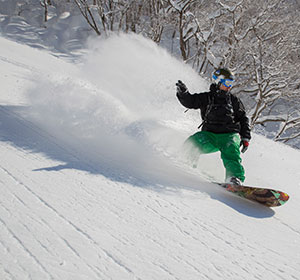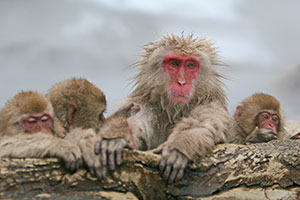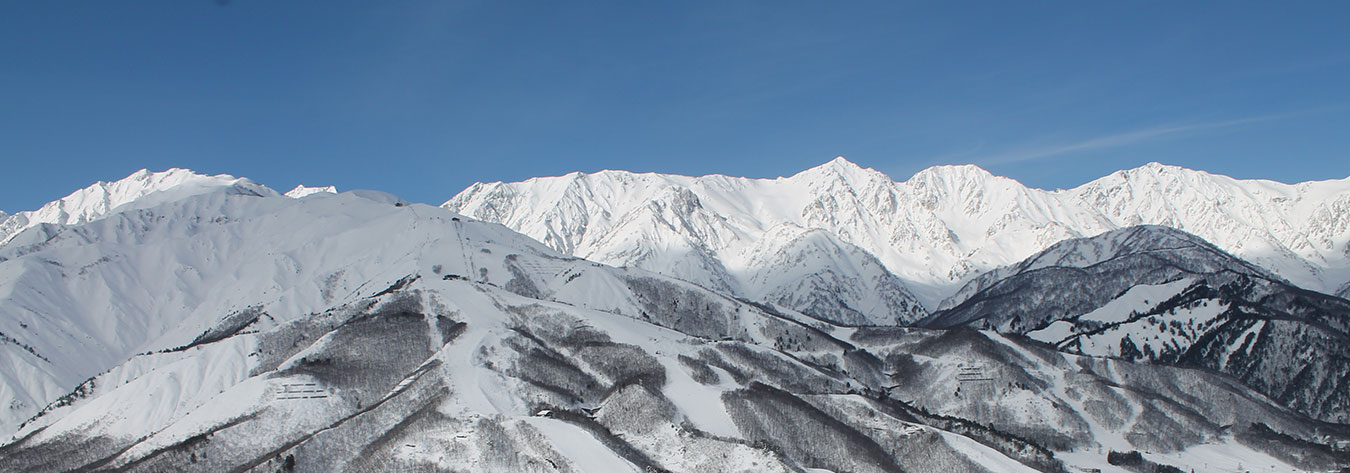
The area boasts some of the best powder snow in Japan.
Better known as the Northern Japan Alps, the mountainous region surrounding Hakuba Valley in Nagano Prefecture gained international fame as a ski resort in 1998. It was in that year that the area hosted the Winter Olympic and Paralympic Games, as well as a number of competitions, including ski jumping and alpine skiing.
With the majestic presence of Mt. Goryu (2,814 metres), Mt. Karamatsu (2,696 metres), Mt. Shirouma (2,932 metres) and other snow-capped peaks, Hakuba is a hub for outdoor sports on Honshu.
The ski resorts of Hakuba Valley—Jiigatake, Kashimayari, Yanaba, Hakuba Sanosaka, Hakuba Goryu, Hakuba 47, Hakuba Happo-one, Hakuba Iwatake, Tsugaike Kogen, Hakuba Norikura and Hakuba Cortina—make up the largest grouping of ski fields in Japan.
This offering, which includes 147 courses, 130km of trails, 108 lifts and a ski area of 956ha, attracts powder enthusiasts from around the world. The area has been described as the Zermatt or Whistler of Asia.
As well as providing top-class options for snowboarding and skiing, the resorts offer snowmobile tours, cross-country skiing, snowshoeing, backcountry ski tours and snow-tubing activities.

The Japanese macaques in Jigokudani Monkey Park are a popular attraction.
Visitors can enjoy a wide provision of onsen (hot springs). Indeed, a short bus ride from Hakuba is one of the area’s most popular attractions: the onsen-loving Japanese macaques in Jigokudani Monkey Park.
All that is in addition to a tradition of providing hospitality and service that goes back generations; Hakuba is known for the warm welcome it extends to visitors. It has attracted both domestic and international entrepreneurs.
Among those to have set up shop are restaurateurs, hoteliers, realtors and adventure sports retailers, all with full backing from the local community and government.
Services provided by the community of 9,000 residents include hotels with bilingual concierge and shuttle buses to resorts.
Renowned for its strong food culture, the valley is dotted with both modern and traditional restaurants that feature an array of dining options.
Free Wi-Fi and English-language menus, guidebooks and websites are a common feature, and local buses, roaming taxis, car rentals and childcare services are also available.
Bespoke providers
Among the firms in Hakuba that cater for guests’ outdoor sports needs are Evergreen Outdoor Center, which runs a ski school, winter guiding operations and green season outdoor tours. Rhythm Snow Sports supplys high-end rental and retail winter sports equipment; and Boot Solutions offers a personal boot-sizing service.
When visitors return to base, they can count on the hospitality of world-class hoteliers and realtors in the valley. Among these are Hakuba Grand Apartments, which offers modern condominiums; Hakuba Tokyu Hotel, an international resort hotel; Shirouma-so Ryokan, an award-winning traditional Japanese hotel; and Hotel La Neige Higashi-kan, a classic European-style hotel.
The community in Hakuba does not welcome only domestic and in-bound visitors, but also seeks to place the region on the map in the outdoor activities market. Hakuba Valley, for instance, is a tourism organisation of firms that run the lifts for the valley’s 11 ski resorts, and represents three of the area’s resort towns: Omachi City, Hakuba Village and Otari Village.
To increase Hakuba’s brand image as a world-class provider of outdoor sports, the organisation has partnered with independent ski resorts in North and South America, Australia and Asia.
Under the umbrella of the Mountain Collective, a cross-promotion initiative, the organisation and its partners provide pass holders with a number of benefits, including discounted ski passes across member resorts.
Similarly, the community-run initiatives Happo-one Tourism Association and Hakuba Tourism are joining forces with international and local vendors in the valley to promote investment and in-bound tourism to the region.
Winter wonderland
Hakuba can be reached from Tokyo and its main international airports in less than three hours by Shinkansen, bus or car, making it within easy reach for both short- and long-term trips.
Blanketed in winter by some of the finest powder in the country, the area is tapping its illustrious history, reputation for outdoor activities, and tradition of hospitality in a bid to woo new and repeat customers.
Hakuba may be one of Japan’s best-kept secrets but, if the locals and their foreign business partners have their way, that is set to change soon.






